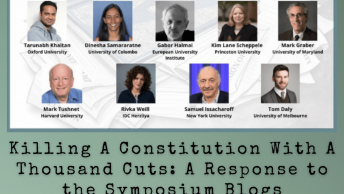Prof. Ballakrishnen responds to the comments from Akshaya Kamalnath, Nida Kirmani and Hemangini Gupta on their book Accidental Feminism: Gender Parity and Selective Mobility among India’s...
This is a two-part series on the analysis of the National Education Policy through gendered lines.
The Union Cabinet of India has approved the National Education Policy 2020 (NEP) for implementation. It is set to be the guiding document of India’s future education system, containing several...
The fourth part of our discussions under the New Scholarship series around public law themed articles will include pieces featured in the recently released Volume 9 of the Indian Journal of...
In this piece, Rangin Tripathy and Chandni Kaur Bagga introduce the arguments they make in their research article titled “Who Are Our Judges? Assessing the Information Disclosure Practice of Indian...
This Response Piece is part of a series of posts indexed here discussing the public law themed articles featured in the recently released Issue 2 of the 2020 Volume of the Indian Law Review. This is...
[Ed Note – We are hosting an international blog symposium on India and Global Decline in Democracies as a part of our New Scholarship initiative. We discussed Professor Tarunabh Khaitan’s article...
In this post the author summarizes his research article - "Basic without Structure? : The presidential order of 1954 and the Indo-J&K constitutional relationship" published in the Issue 2 of 2020...
In this piece, the author analyses the effect of the Supreme Court's judgement in the Shaheen Bagh case on the right to protest safeguarded in any democracy.
Ed Note– We are hosting an international blog symposium on India and Global Decline in Democracies as a part of our New Scholarship initiative. We will be discussing Professor Tarunabh...










